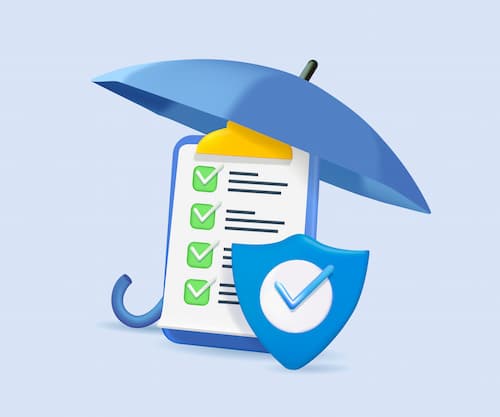How much renters insurance do I need?
You need enough renters insurance to cover everything you own, as well as enough liability coverage to portect you in case you're held responsible for injuries to someone else, or damage to their property. Let's break down the two main coverages.
Renters insurance calculator
Average renters insurance rates in TexasMost & least expensive ZIP codes for renters insurance in Texas
| ZIP code | City | Highest rate |
|---|---|---|
| 78368 | Mathis | $264 |
| 77014 | Houston | $264 |
| 77444 | Guy | $263 |
| 77374 | Thicket | $262 |
| ZIP code | City | Lowest rate |
|---|---|---|
| 75070 | McKinney | $183 |
| 78132 | New Braunfels | $183 |
| 75072 | McKinney | $183 |
| 75013 | Allen | $183 |
How much renters insurance personal property coverage do I need?
There are a few factors to consider when determining how much renters insurance you need. The first is the value of your belongings. If you have expensive furniture, electronics, or other valuable items, you'll want to make sure they're fully covered in the event of damage or theft. Second, consider how much it would cost to replace your belongings if they were lost in a fire or other disaster. Finally, take into account any special coverage you may need, such as flood insurance or coverage for high-value items.
Determining this amount takes work, but with our expert tips on how to create an inventory list for home insurance, it shouldn’t be too difficult.
Your best bet is to create a personal inventory of your possessions and assign value to these items for personal possessions coverage. The Insurance Information Institute says some of the items in this inventory should include:
- Appliances and electronics
- Clothing
- Furniture
- Other items ranging from kitchen utensils to towels and bedding
After adding up the replacement values you have assigned to these items, you should have a rough idea of how much coverage you need.
Remember that some items -- such as expensive jewelry and artwork -- may require you to purchase a separate rider to cover their value. Speak to your insurance agent about whether you need such a rider.
How much liability coverage do I need for renters insurance?
Most renters insurance policies include somewhere between $100,000 and $300,000 in liability coverage. If your renter's insurance policy's liability coverage limits seem inadequate, consider supplementing the coverage with an umbrella policy. This form of coverage can provide you with an additional $1 million or more in liability protection.
What does renters insurance cover?
A typical renters insurance policy offers three major types of coverage:
1. Personal property coverage: As with homeowners insurance, most renters insurance policies reimburse you for losses of your possessions that are due to perils such as:
- Fire and smoke
- Lightning
- Theft and vandalism
- Explosions
- Windstorms
- Some types of water damage
The policy itself will spell out which types of disasters it covers.
2. Liability coverage: The liability portion of a renters insurance policy protects you when you are responsible for damages to other people or their property. This policy will reimburse you for fixing the damages or protect you in the event of a lawsuit. The liability portion of your policy provides no-fault medical coverage. This means if someone hurts themselves on your property your policy will pay their medical bills.
3.Additional living expenses coverage: Renters insurance policies usually offer additional living expenses or loss of use coverage. This kicks in if your rental unit is destroyed or severely damaged and you need funding to secure a new place to live while the rental unit is being repaired. In most cases, you are covered for an amount equivalent to the difference between your normal living expenses and the additional expense of securing temporary quarters. Additional living expenses might cover costs such as hotel bills, rentals on a temporary basis, and restaurant costs.
What kind of things does renters insurance not cover?
While renters insurance offers robust coverage that protects you in the wake of mishaps, there are a few things it does not cover.
It is crucial to note that a renters policy will not protect you from flooding damage. For such protection, you need to purchase a separate flood insurance policy. Earthquake coverage typically is not a part of a renters insurance policy either. But you may be able to purchase a rider -- at an additional expense -- that covers earthquakes.
Is renters insurance required by law?
No, renters insurance is not required by law. However, in most states, landlords can have their own renter's insurance requirements and require renters insurance before signing a lease.
Oklahoma is the only state where this is not true, although, in some states, there may be limits on how much insurance a landlord can require. For example, Oregon landlords can only require tenants to have $100,000 in liability.
It's a wise decision to have renters insurance, even if your landlord requires it. This type of coverage reimburses you if personal items are damaged or stolen, and it protects you if you injure someone else or destroy their property.
What happens if you don't have renters insurance?
If renters insurance is part of your lease agreement and you don’t maintain it, your landlord may terminate the lease.
If your landlord doesn’t require renters insurance and you choose not to get it, you likely won’t miss it unless something goes wrong. However, if damage occurs to your property or someone is injured in your apartment and sues you, you could face serious financial consequences. Without renters insurance, there won’t be any coverage for you or your property, and you will have to cover everything out of pocket.
FAQ: Renters insurance
Does California require renters insurance?
Renters insurance is not required in California. That may lead you to ask, “Well then, is renters insurance necessary?” But just because coverage is not required doesn’t mean it’s a good idea to skip purchasing a policy.
In fact, the California Department of Insurance flatly says that "you should consider purchasing renter’s insurance," noting the many coverages it provides.
Although the state does not require you to purchase a policy, landlords still can require you to have a policy in place before you sign a lease.
Do I need renters insurance before signing a lease?
You may need a renters insurance policy before signing a lease. Some landlords require it as part of the lease agreement and may require proof of coverage to complete the lease or before you move in.. It's best to check your lease agreement or ask your landlord directly.
Should I get renters insurance for an apartment even though my landlord has insurance?
Your landlord’s insurance does not cover your possessions or protect you against liability judgments. The only way to get such protection is to purchase renters insurance. A renters policy is affordable, and it’s almost always a good investment in protecting your financial future.




